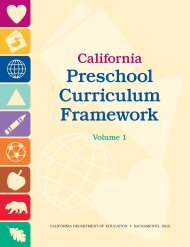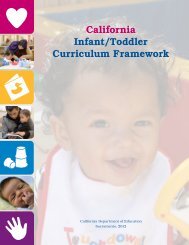California Preschool Learning Foundations - ECEZero2Three ...
California Preschool Learning Foundations - ECEZero2Three ...
California Preschool Learning Foundations - ECEZero2Three ...
You also want an ePaper? Increase the reach of your titles
YUMPU automatically turns print PDFs into web optimized ePapers that Google loves.
FOUNDATIONS IN<br />
Social-Emotional<br />
Development<br />
This section describes foundations<br />
for the behavior of preschool<br />
children in the domain<br />
of social-emotional development. The<br />
goal of the <strong>California</strong> Department of<br />
Education (CDE) in developing these<br />
foundations was to describe the behaviors<br />
that are typical of preschool children<br />
who are making good progress<br />
toward readiness for kindergarten. The<br />
research focus was, in particular, on<br />
behavior reflecting age-appropriate<br />
competency for children in the 40- to<br />
47-month age span and children in<br />
the 52- to 59-month age span.<br />
These competencies are included<br />
as foundations for children “at around<br />
48 months of age” and “at around<br />
60 months of age,” respectively. In<br />
focusing on the social and emotional<br />
foundations of school readiness, a<br />
central assumption—well supported<br />
by developmental and educational<br />
research—was that school readiness<br />
consists of social-emotional competencies<br />
as well as other cognitive and<br />
motivational competencies required for<br />
success in school. The foundations<br />
of social and emotional development<br />
described here—including the growth<br />
of self-awareness, self-regulation, cooperation<br />
and responsibility, social and<br />
emotional understanding, empathy and<br />
caring, interactions with peers, friendship,<br />
group participation (such as in<br />
the classroom), initiative in learning,<br />
attachments to parents, close relationships<br />
with teachers and caregivers,<br />
and interactions with familiar adults—<br />
are each predictive of children’s adaptation<br />
to school and their academic<br />
success. Research literature highlighting<br />
the social-emotional foundations<br />
of early school success has been published,<br />
and relevant studies from that<br />
literature are cited in the bibliographic<br />
listings at the end of this section.<br />
School readiness consists of<br />
social-emotional competencies as<br />
well as other cognitive and motivational<br />
competencies required for success<br />
in school.<br />
The CDE’s endeavor to describe the<br />
behaviors typical of preschool children<br />
who are on course for school readiness<br />
involved three additional assumptions.<br />
The first was the assumption<br />
that young children have access to the<br />
appropriate kinds of social interactions,<br />
experiences, and environments<br />
that normally support healthy development.<br />
Young children growing up in<br />
markedly deprived settings experience<br />
<strong>California</strong> Department of Education • <strong>Preschool</strong> <strong>Learning</strong> <strong>Foundations</strong>, Volume 1 1
















